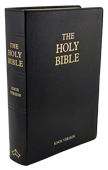The Holy Bible – Knox Translation
The Second Book of Esdras or the Book of Nehemias
|
Chapter 7
|
1
When the wall was finished, and I had set up the gates, I made a register of the door-keepers; of the singers, too, and the Levites.
2
Then I entrusted the defence of the city to my kinsman Hanani, and to Hananias, who was controller of the temple palace at Jerusalem, and eminent, as it seemed to me, in honour and piety;
3
these I made answerable for seeing to it that the gates should never be opened till the sun was up. At nightfall, the gates must be bolted and barred in their presence. And such citizens of Jerusalem as had houses facing the wall must take their turn at keeping watch.
4
Far and wide the city stretched, and its citizens were few and far between; the houses in it had not yet been repaired.
5
But I, God putting such a resolve into my heart, mustered them all, nobles, rulers and common citizens alike, to make a register of them. I found the old register, with the names of those who first returned from exile, and their numbers, it proved, were as follows.
6
These were the numbers in which they came back to Jerusalem, and to the various cities of Juda, these exiles that had been taken to Babylon by the Chaldaean king Nabuchodonosor, and afterwards returned home.
7
Their leaders were Zorobabel, Josue, Nehemias, Azarias, Raamias, Nahamani, Mardochaeus, Belsam, Mespharath, Begoai, Nahum and Baana. These were the numbers the various clans of Israel provided:
8
Pharos, two thousand one hundred and seventy-two,
9
Saphatia, three hundred and seventy-two,
10
Area, six hundred and fifty-two,
11
Phahath-Moab … Josue-Joab, two thousand eight hundred and eighteen,
12
Aelam, one thousand two hundred and fifty-four,
13
Zethua, eight hundred and forty-five,
14
Zachai, seven hundred and sixty,
15
Bannui, six hundred and forty-eight,
16
Bebai, six hundred and twenty-eight,
17
Azgad, two thousand three hundred and twenty-two,
18
Adonicam, six hundred and sixty-seven,
19
Beguai, two thousand and sixty-seven,
20
Adin, six hundred and fifty-five,
21
Ater, coming from Hesecias, ninety-eight,
22
Hasem, three hundred and twenty-eight,
23
Besai, three hundred and twenty-four,
24
Hareph, a hundred and twelve.
25
And the various townships provided: Gabaon, ninety-five,
26
Bethlehem and Netupha, a hundred and eighty-eight,
27
Anathoth, a hundred and twenty-eight,
28
Bethazmoth, forty-two,
29
Cariathiarim, Cephira and Beroth, seven hundred and forty-three,
30
Rama and Geba, six hundred and twenty-one,
31
Machmas, a hundred and twenty-two,
32
Bethel and Hai, a hundred and twenty-three,
33
(the other) Nebo fifty-two,
34
(the other Aelam, one thousand two hundred and fifty-four),
35
Harem, three hundred and twenty,
36
Jericho, three hundred and forty-five, Lod,
37
Hadid and Ono, seven hundred and twenty-one,
38
Senaa, three thousand nine hundred and thirty …
39
And the various priestly clans provided: Idaia, in the line of Josue, nine hundred and seventy-three,
40
Emmer, a thousand and fifty-two,
41
Phashur, a thousand two hundred and forty-seven,
42
Arem, a thousand and seventeen. Levites there were,
43
named after Josue and Cedmihel, that came down
44
from Oduias, seventy-four; singers,
45
after Asaph, a hundred and forty-eight;
46
door-keepers, after Sellum, Ater, Telmon, Accub, Hatita and Sobai, a hundred and thirty-eight.
47
The Nathinaeans included the sons of Soha, Hasupha, Tebbaoth,
48
Ceros, Siaa, Phadon, Lebana, Hagaba, Selmai,
49
Hanan, Geddel, Gaher,
50
Raaia, Rasin, Necoda,
51
Gezem, Aza, Phasea,
52
Besai, Munim, Nephussim,
53
Bacbuc, Hacupha, Harhur,
54
Besloth, Mahida, Harsa,
55
Bercos, Sisara, Thema,
56
Nasia, and Hatipha,
57
Solomon’s servants, Sothai, Sophereth, Pharida,
58
Jahala, Darcon, Jeddel, Saphatia,
59
Hatil, Phochereth, son of Sabaim, son of Amon;
60
these Nathinaeans, including those descended from the servants of Solomon, amounted to three hundred and ninety-two in all.
61
Some of those who came back from Thelmela, Thelharsa, Cherub, Addon and Emmer could not prove whence their ancestors came or whether they were of Israelite stock;
62
they were descendants of Dalaia, Tobia and Necoda, amounting to six hundred and forty-two.
63
Such, too, among the priests were the sons of Habia, of Accos, and of that Berzellai who married a daughter of Berzellai the Galaadite and took his name;
64
they could find no written record of their ancestry, and were expelled from the priesthood;
65
they might not partake of the food reserved for the priests, the governor told them, until there should be a high priest that bore the touchstones of wisdom and truth.
66
The whole number, taken together, amounted to forty-two thousand three hundred and sixty,
67
not counting the men and women servants, of whom there were seven thousand three hundred and thirty-seven, with two hundred and forty-five men and maids that were singers.
68
They had with them seven hundred and thirty-six horses, two hundred and forty-five mules,
69
70
… Some of the chief families made contributions to help the enterprise. The governor handed over to the treasury a thousand gold pieces, fifty bowls, and five hundred and thirty tunics for the priests;
71
the heads of clans, twenty thousand gold pieces, and two thousand two hundred silver pieces,
72
the rest of the people, twenty thousand gold pieces, two thousand silver pieces, and sixty-seven tunics for the priests.
73
And now priests and Levites, singers and door-keepers (and the rest of the people) and the Nathinaeans and all Israel were back in the cities that were their homes.


